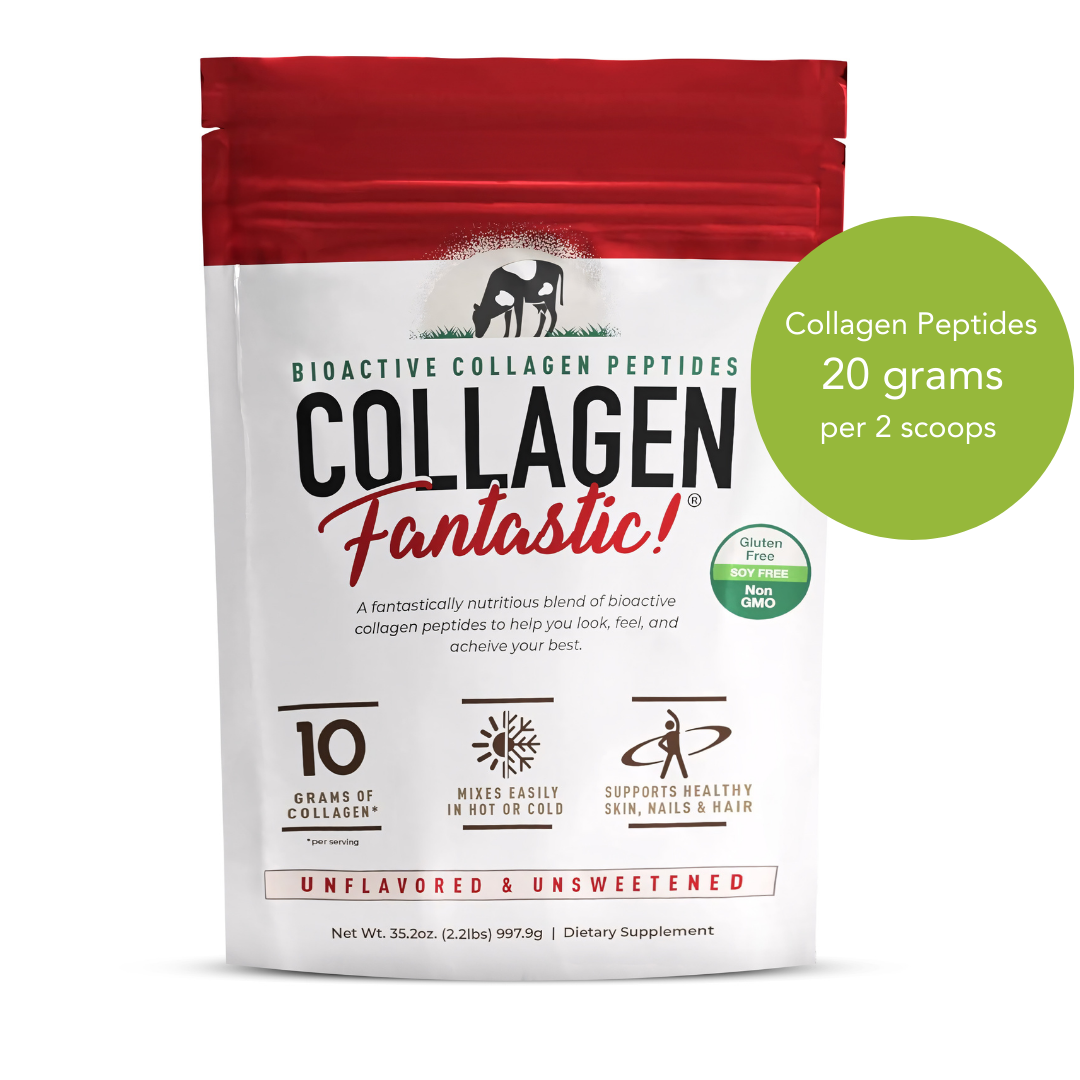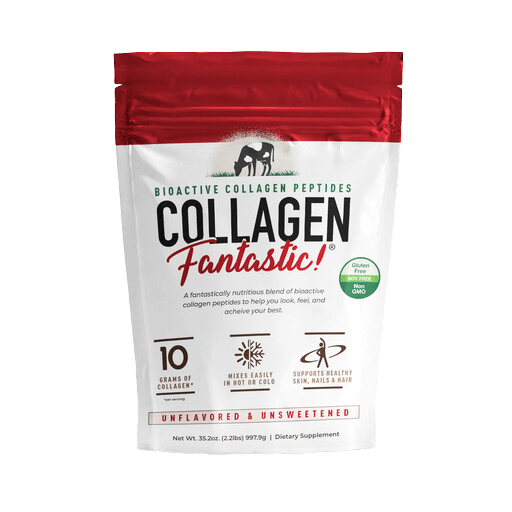Key Takeaways
-
Collagen loading is the strategic practice of temporarily increasing collagen intake to support joint health, connective tissue repair, and recovery.
-
It’s especially helpful during high-volume training, injury recovery, or times of increased physical stress.
-
Collagen supports tendons, ligaments, cartilage, and fascia — the structures that make movement possible.
-
Taking collagen alongside vitamin C, protein, and strength training amplifies its effects.
-
Collagen Fantastic provides clean, unflavored collagen peptides that dissolve easily and support consistent, convenient loading.
Introduction: A New Approach to Strength and Recovery
Protein gets all the attention when it comes to building muscle — and it should. But there’s another piece of the performance puzzle that rarely gets the spotlight: your connective tissue.
Your joints, tendons, ligaments, and fascia determine how well you move, how much force you can generate, and how resilient your body feels during and after training. They’re also the structures that get sore, stiff, or inflamed when training volume increases.
That’s where collagen loading comes in.
Collagen loading isn’t a fad or marketing phrase. It’s a science-backed strategy for strengthening the tissues that hold your entire body together — and it helps athletes and active adults stay consistent, pain-free, and powerful.
What Is Collagen Loading?
Collagen loading is the intentional practice of temporarily increasing your daily collagen intake to support connective tissue recovery and repair.
Instead of sticking to a steady maintenance dose (typically around 10–20 grams per day), collagen loading involves consuming 20–30+ grams per day for a short period — usually two to four weeks.
It’s similar to creatine loading, but instead of saturating muscles with energy stores, you’re providing extra raw materials for:
-
Tendon and ligament repair
-
Cartilage strength
-
Fascia integrity
-
Joint lubrication
-
Skin elasticity and hydration
-
Gut lining resilience
The idea: when your training, stress, or physical demands increase, your collagen should increase too.
Why Collagen Matters for Active Adults
Most people don’t realize that connective tissue recovers much more slowly than muscle.
Muscle tissue adapts relatively quickly because it has a high blood supply.
But tendons and ligaments? Much slower. They’re primarily made of collagen and have limited blood flow, which means:
-
Slow recovery
-
Higher risk of strain
-
Accumulated stiffness
-
Increased joint discomfort
As you age, this becomes even more important. After about age 35, collagen production naturally declines, making joints and connective tissues more vulnerable to stress — unless you support them nutritionally.
Collagen loading helps bridge that gap.
The Science Behind Collagen Loading
Collagen peptides supply the body with glycine, proline, and hydroxyproline — unique amino acids that are specifically used to build connective tissues.
When you ingest collagen peptides, several important things happen:
1. Increased Collagen Synthesis
Research shows that taking 10–15 grams of collagen can increase collagen production in tendons and ligaments when paired with strength training.
Doubling that intake temporarily (20–30 grams) amplifies this process.
2. Improved Tendon & Ligament Strength
Collagen peptides have been shown to stimulate fibroblasts — the cells that produce collagen in connective tissues. This results in:
-
Stronger tendons
-
More resilient ligaments
-
Better load tolerance
In other words: your joints feel stronger and more stable.
3. Reduced Joint Discomfort
Studies show improvements in joint pain and mobility with consistent collagen intake — especially in individuals who train frequently or are over 40.
More collagen = more lubrication and smoother movement.
4. Enhanced Recovery From High Training Volume
Collagen helps reduce the aches and stiffness that follow heavy training weeks or new training phases. Loading provides extra support when recovery demands spike.
When Should You Consider Collagen Loading?
You don’t need to load collagen all the time. It’s most beneficial during periods where your connective tissue is under more stress.
You should consider collagen loading when:
-
You’re increasing your training volume
-
You’re beginning a new strength program
-
You’re adding more running, jumping, or explosive work
-
You’re recovering from an injury or strain
-
You experience joint discomfort during or after workouts
-
You’re 40+ and training regularly
-
You’re preparing for a physically demanding event
In these times, your collagen requirements go up.
Collagen loading meets those demands.
How to Do Collagen Loading Correctly
Here’s the effective, research-backed loading approach:
1. Increase to 20–30 grams per day for 2–4 weeks
A typical daily dose:
-
2 scoops of Collagen Fantastic (20g)
or -
3 scoops during heavier loading phases (30g)
This gives your body the extra amino acids needed for increased collagen synthesis.
2. Split Your Doses for Better Absorption
Your body uses collagen more efficiently when taken in smaller, spaced doses.
Ideal schedule:
-
Morning: 10g (1 scoop)
-
Afternoon or post-workout: 10g
-
Optional evening dose: +10g for full 30g loading
Collagen Fantastic is unflavored and dissolves easily into coffee, tea, smoothies, or even water — making multiple small doses simple.
3. Pair with Vitamin C
Vitamin C is required for collagen synthesis. Without it, collagen peptides can’t do their job as effectively.
Pair collagen loading with:
-
Citrus fruit
-
Berries
-
Kiwi
-
Peppers
-
Or just a small vitamin C supplement (250–500 mg)
4. Strength Train While Loading
Collagen synthesis increases the most when collagen is consumed 30–60 minutes before strength training — especially tendon- and joint-loading exercises like:
-
Squats
-
Deadlifts
-
Lunges
-
Step-ups
-
Presses
You’re providing raw materials (collagen peptides) and stimulus (load).
This combination produces the best results.
5. Stay Consistent — Daily Intake Matters
Collagen benefits accumulate. Missing occasional days isn’t a problem, but consistency during a loading phase amplifies results.
After loading, most people return to a maintenance dose of 10–15 grams daily.
What Are the Benefits of Collagen Loading?
Here’s what most people notice when they commit to a full loading cycle:
1. Less Joint Discomfort During and After Workouts
Connective tissue becomes better hydrated, better lubricated, and better able to handle mechanical stress.
Movement feels smoother.
Workouts feel more comfortable.
Recovery feels easier.
2. Faster Recovery Between Workouts
When your tendons and ligaments recover more quickly, you can train more consistently without feeling beat up.
This is especially noticeable for:
-
Runners
-
Lifters
-
Cyclists
-
HIIT enthusiasts
-
Adults 40+
3. Better Mobility and Flexibility
Collagen supports fascia — the tissue that surrounds your muscles.
Healthier fascia means:
-
Less tightness
-
Better range of motion
-
Reduced morning stiffness
4. Stronger Tendons and Ligaments
Connective tissue adapts more slowly than muscle. Loading helps “catch them up” to your muscle gains, reducing strains and overuse injuries.
5. Improved Skin, Hair, Nails, and Gut Health
While loading is done for performance reasons, many people notice aesthetic or digestive benefits too.
This is simply a bonus — and a testament to how widely collagen peptides are used in the body.
The Role of Collagen Fantastic in Collagen Loading
Collagen Fantastic is ideal for a loading protocol because it’s:
-
Unflavored
-
Mixes instantly
-
Highly bioavailable
-
Sourced from high-quality collagen peptides
-
Free from fillers, sweeteners, and unnecessary ingredients
-
Third-party tested
-
Clean and easy to incorporate into daily routines
Its simplicity and purity make it effective for both short loading phases and long-term maintenance.
Frequently Asked Questions
1. How long should I do collagen loading?
Most people load for 2–4 weeks, then return to a maintenance dose.
If you are recovering from an injury, a longer loading period may be beneficial.
2. Can I take collagen and whey protein together?
Yes — and you should.
Whey rebuilds muscle.
Collagen rebuilds connective tissue.
They complement each other perfectly.
3. Should I take collagen on rest days?
Absolutely. Connective tissue repair happens between workouts.
4. Will collagen loading make me gain weight?
No — collagen is low-calorie and supports muscle recovery, mobility, and metabolic health. There is no evidence that collagen causes weight gain.
The Bottom Line
Collagen loading is a simple, science-backed way to support the structures that make movement possible — especially as you age, increase training volume, or want to prevent discomfort and injury.
It provides your body with the extra support it needs to recover quickly, stay resilient, and feel strong day after day.
Collagen Fantastic makes loading easy, clean, and effective — giving your tendons, joints, fascia, and connective tissues the raw materials they need to keep you moving powerfully.












